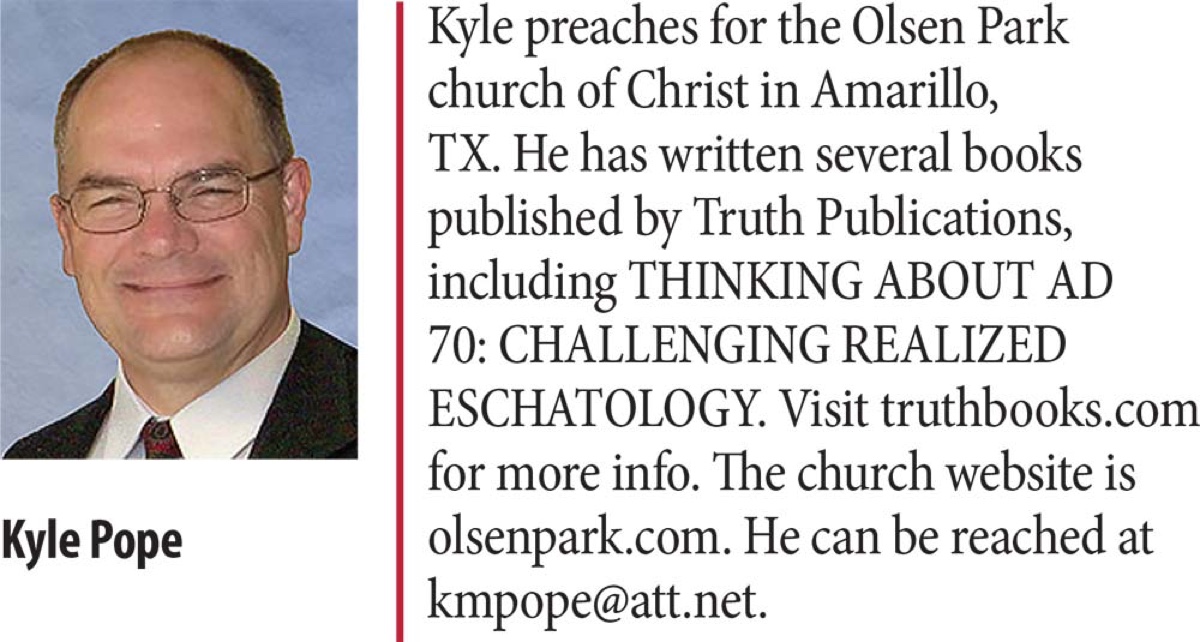by Kyle Pope
Synopsis: Does Jesus’s warning to fear the One who can “destroy both body and soul in hell” teach the annihilation of the soul? If not, how should this statement be understood?
When Jesus sent out the twelve to teach, He warned: “And do not fear those who kill the body but cannot kill the soul. But rather fear Him who is able to destroy both soul and body in hell” (Matt. 10:28, NKJV). Some have used this text in defense of the false doctrine of the annihilation of the soul, yet the passage offers no such support for this error.
This is seen first in the very contrast Jesus offers. It is natural to fear those who can harm the body. As Christ warns of impending persecution, He addresses this most certain anxiety: a persecutor is limited in what he can do. As Luke’s account adds, after killing the body, persecutors “have nothing more that they can do” (Luke 12:4). As fearful as death may be, the persecutors’ capabilities must be kept in perspective. However, there is One, who, “after He has killed has power to cast into hell” (Luke 12:5). This One is God. Jesus’s point clearly relies on the premise that the soul survives the death of the body. This enables God to have power over the soul’s condition and abode after the death of the body. This reality demands a greater fear for the One holding post-mortem (i.e., “after death”) power, in contrast to those with only pre-mortem (i.e., “before death”) power.
Further, we should note that Luke’s phrase “power to cast into hell” is used synonymously with Matthew’s wording “is able to destroy both soul and body in hell.” As we have already seen, the contrast is post-mortem versus pre-mortem power. Some would contend that, even if the soul survives the death of the body, its existence is short-lived. They would argue that the phrase, “cannot kill the soul,” infers that God can “kill the soul,” which they take to mean annihilation of the soul. If so, the contrast of post-mortem and pre-mortem power becomes a matter of timing, not different power. Kenneth Chumbley, in his commentary on Matthew, rightly points out: “Persecutors should not be feared for they can only harm the body, our mortal life. God, however, can do what man cannot: destroy our ‘soul and body’ the (whole person) in hell” (198). The earthly persecutor is unable to extend his punishment while God can.
If the issue is annihilation of the soul, the earthly persecutor would actually have power over the soul, in that his deeds would inflict the wound (physical death) that would lead to annihilation of the soul (whenever God gets around to it). While this would offer some reason to fear God over man, it actually leaves us with a dilemma regarding the two accounts of Matthew and Luke. Does Luke stop short in his description? That is, does he fail to explain that God “casts into hell” but then ultimately annihilates the soul? Both accounts lead immediately into statements about the valuation of sparrows (Matt. 10:29; Luke 12:6). If this is the actual meaning, how can we explain the omission? The answer is that both Matthew and Luke address the same thing. In other words, to “kill the soul” is to cast it into hell. This is not simply a delay in the extinction of life the earthly persecutor initiates, but it refers to a condition in which the living soul is spiritually dead as it faces continuing, ongoing, and unending decay and destruction of itself in hell.
This leads to the final aspect of this text used by annihilationists—the meaning of the words “kill” and “destroy.” By earthly appearance alone, death would seem to be defined as the absence of life. However, it is clear from Scripture that this is an insufficient definition. We see this from the first references to death in Scripture. When the man and the woman were prohibited from eating from the tree of the knowledge of good and evil, they were promised, “the day that you eat of it you shall surely die” (Gen. 2:17). The promise was not that they would die sometime in the future, but in “the day” they ate, they would die. When their sin took place, physical life continued, but the first couple was separated from God (Gen. 3:22-24). The same is said of the consequence of sin by their offspring. God declared to the Israelites, “your iniquities have separated you from your God” (Isa. 59:2). Paul told the Ephesians, “you He made alive who were dead in trespasses and sins” (Eph. 2:1). Before their conversion, the Ephesians had been physically alive, but spiritually dead because they were separated from God. Even physical death, upon consideration of further revelation from God, must be understood as a separation. James declared, “as the body without the spirit is dead, so faith without works is dead” (Jas. 2:26). The preacher of Ecclesiastes declared that in death, “the dust will return to the earth as it was, and the spirit will return to God who gave it” (Eccl. 12:7). So, both physical death and spiritual death are properly understood as the separation of either the spirit from the body or the spirit from fellowship with God.
In Jesus’s words in Matthew 10:28, how are we to understand the phrase “kill the soul”? If spiritual death in this life is defined as separation from God, why would we assume that it is any different in the age to come? In that case, the “more” that Luke says God is able to do to the departed soul involves a renewed separation from God after the spirit has returned to God for judgment. This is what the book of Revelation speaks of as the “second death” (Rev. 20:6).
In what sense, then, is it that God will “destroy both body and soul in hell”? “Destroy” in Greek is apollumi. Its use in Scripture defines its meaning. It is often used simply as an intensified synonym of the verb “to kill.” Herod sought the infant Jesus that he might “destroy (apollumi) Him” (Matt. 2:13). The Pharisees took council how they “might destroy (apollumi)” Jesus (Matt. 12:14). Jesus told parables in which a king and a landowner “destroy” those who rebel against them (Matt. 21:41; 22:7). Additionally, Scripture often uses it of an undesirable condition of people or things. New wine put in old bottles makes “the bottles perish (apollumi)” (Matt. 9:17). Jesus came to save the “lost (apollumi) sheep of the house of Israel” (Matt. 15:24) and “that which was lost (apollumi)” (Matt. 18:11). Obviously, in this case, He was not seeking annihilated souls, but rather those in a condition of destruction and separation from God. Jesus taught that “whoever desires to save his life will lose (apollumi) it, but whoever loses (apollumi) his life for My sake will find it” (Matt. 10:39; 16:25). This is not teaching martyrdom as a guaranteed passage to salvation. Following Jesus may mean persecution (i.e., the destruction of the state of life one might prefer), but rejection of Jesus will lead to destruction of the soul (i.e., the destruction of the state of life that would be preferred eternally).
Kerry Duke, in his article on this text, explains it well:
We often apply a word in a physical way when the Bible uses it in a spiritual sense. Destroy in Matthew 10:28 does not refer to the destruction of a material object. It is spiritual destruction which has nothing to do with termination of being. . . The destruction of Matthew 10:28 is an end of a state of existence (one characterized by the opportunity to commune with God), not the end of existence itself (“Destroyed into Nothing?” Firm Foundation 112 [June 1, 1997]: 9).
An interesting proof of this is seen in the use of this word in the mouth of the unclean spirit who asked Jesus, “Did you come to destroy us?” (Mark 1:24). In a similar situation, the demon asked, “Have you come here to torment us before the time?” (Matt. 8:29). These parallel statements speak volumes! “Torment” is used as a synonym for destruction. Revelation 20:10 tells us that the Devil and his angels will be cast into the lake of fire, and “they will be tormented day and night forever and ever.” If apollumi is used of the conscious eternal torment of demons, what reason would we have to conclude that Matthew 10:28 does not use it in the same sense? The destruction of the soul and body in hell is not annihilation but the ongoing eternal destruction of the living eternal spirit.
As distasteful as this thought may be, the way to address this horror is to teach men how it can be avoided, not to deny its reality.


